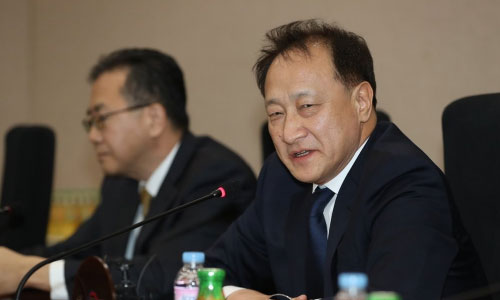MOSCOW - Denuclearization of North Korea should become irreversible so that anti-Pyongyang sanctions can be lifted, South Korean Ambassador in Moscow Lee Sok-bae said in an interview with Russian news agencies on Wednesday.
“As far as the possibility of easing or lifting the sanctions imposed by the United Nations Security Council on North Korea is concerned, as President Moon Jae-in said at the New Year’s news conference, the solution to a sanctions problem depends on progress in the denuclearization of North Korea,” the diplomat said.
“To have the sanctions eased, North Korea needs to take decisive action in denuclearization and it is necessary to, at least, come to the conclusion that the process has reached an irreversible stage,” he added. “While convincing North Korea that its denuclearization measures are the right choice, the government of the Republic of Korea plans to carry on with diplomatic efforts so that North Korea can make progress in denuclearization.”
The ambassador pointed out that Seoul had recently made significant efforts for peace and denuclearization on the Korean Peninsula. He recalled that since the beginning of 2018 the South and North had held three summit meetings. Moreover, the first ever summit was held between North Korea and the United States.
“Now the US and North Korea are looking for opportunities to resume working talks so that a third summit can be held,” the ambassador continued. “It is a relevant moment for joining diplomatic efforts on order to give impetus and to resume the North Korea - US dialogue, and through the dialogue and negotiation to create conditions for North Korea to take concrete steps aimed at denuclearization.”
In 2017, the United Nations Security Council unanimously passed a resolution toughening sanctions against North Korea in response to Pyongyang’s missile and nuclear tests. The document banned exports of minerals and other goods, including coal, iron, lead, seafood and textile goods, from North Korea. Supply of natural gas and its condensate to the country is banned as well as any joint ventures with North Korean legal entities. The UN Security Council imposed restrictions on imports of crude and oil products, which could not exceed two million barrels per year. (TASS)
Home » World » Denuclearization Should be Irreversible to Lift Anti - N.Korea Sanctions, Says Ambassador
Denuclearization Should be Irreversible to Lift Anti - N.Korea Sanctions, Says Ambassador

